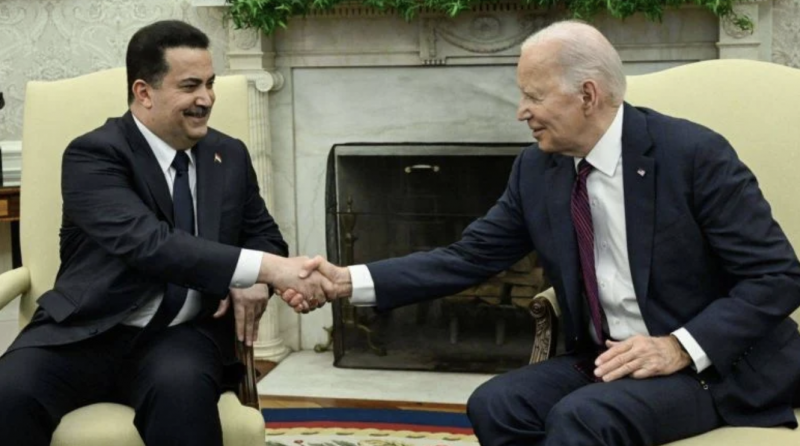
Mohammad Shia al-Sudani and Joe Biden, April 15, 2024, in Washington. (Credit: AFP)
This is Mohammed Shia al-Sudani’s first trip to Washington. In office since October 2022, he has been trying to maintain a fine balance between his relations with neighboring Iran and with his US partner.
The Iraqi prime minister arrived in the US on Saturday on a week-long tour, during which he met US President Joe Biden on Monday. His trip came against a backdrop of heightened tensions, marked by Iran’s unprecedented retaliation over the weekend, in response to Israeli strikes on Tehran’s consulate in Damascus on April 1.
Bilateral discussions focused on the renewal of economic ties between the two countries and the future of US troops’ presence in Iraq.
Facts
• Sudani met Biden on Monday and held talks on Tuesday with Secretary of Defense Lloyd Austin, Secretary of State Antony Blinken and Biden’s Senior Advisor for Energy and Investment Amos Hochstein.
• Sudani, accompanied by Iraqi private sector representatives, is also due to meet US energy companies, the chairman of JP Morgan and the president of arms producer Lockheed Martin in Houston this week, with the main aim of promoting US economic commitment in Iraq.
• Although no military officials are included in the Iraqi delegation, military cooperation is on the agenda. The Pentagon announced on Monday that it had approved the potential sale of C-172 and AC/RC-208 aircraft contractor logistics support and training equipment, for an estimated cost of $140 million.
Context
• Sudani arrived in Washington on the day Tehran carried out an unprecedented drone and missile attack on Israeli territory, in retaliation for the airstrikes that killed seven Islamic Revolutionary Guard Corps officials in Syria on April 1.
• While a small part of the projectiles was fired from Iraq against Israel, the Iran-aligned militias present in the country didn’t broadly participate, as they wanted to let Iran respond directly and didn’t want to embarrass Sudani during his visit.
• Baghdad, which Tehran warned, opened its airspace to US Air Force refueling planes to enable them to support fighter jets tasked with shooting down Iranian projectiles, Al-Monitor reported. A US Patriot battery in Erbil destroyed at least one Iranian ballistic missile, according to US officials.
• Sudani’s trip also came as the war in Gaza entered its seventh month. He urged the international community, including the US, to put more pressure on his Israeli counterpart, Benjamin Netanyahu, to end the conflict.
• Since the outbreak of the war in the Gaza Strip, a group of pro-Iranian Shiite militias calling themselves the Islamic Resistance of Iraq has carried out more than a hundred attacks against American bases in Iraq, Syria and Israel. In retaliation, two members of the al-Nujuba faction were killed on Jan. 4 in a US strike in the heart of the Iraqi capital. This incident provoked the ire of the pro-Iranian militias, whose support led to the election of the current Iraqi prime minister, Mohammed Shia al-Sudani
• Under pressure, Sudani announced at the end of January the formation of a bilateral committee tasked with ending the presence of US-led international coalition forces. Created in 2014 to fight the Islamic State (IS), the coalition has around 2,500 US troops deployed in Iraq.
• Following the death of three American soldiers in Jordan in a strike attributed to the Kataeb Hezbollah, Iran has since called on Iraqi militias to suspend their attacks on American interests to avoid a regional escalation — a directive that has since been followed, albeit reluctantly.
The stakes
• Amidst the deliberations of the Iraqi High Military Commission regarding the future presence of US troops in Iraq, Sudani affirmed his commitment to maintaining collaboration with the US. He expressed hope for a new phase in US-Iraqi relations. Since assuming office, the premier has prioritized establishing a mutually beneficial relationship, epitomized by the slogan “Iraq first,” which underscores respect for the nation’s sovereignty. This principle often faces challenges in Iraq, torn between its powerful American partner and its Iranian ally, whose influence has grown in recent years through affiliated groups. Analysts argue that expediting the withdrawal of American troops is not in Iraq’s interest. Such a move could potentially enable the resurgence of IS or further entrench Iran’s influence, aligning Iraq definitively with the pro-Iranian camp.
• For Baghdad, the objective is to broaden cooperation with the US beyond security and military domains. The terms outlined in the 2008 Strategic Framework Agreement, which remains in effect, encompass deeper economic and investment connections. To recalibrate this relationship, Sudani informed the American President about the “substantial influx of capital” into the country from Qatar, the UAE, Saudi Arabia and Egypt. Pointing to a series of banking and financial reforms spurred by American influence, Sudani highlighted a “new reality” in Iraq’s investment climate, expressing hope to leverage the nation’s relative stability to advance its economy.
• Additionally, during their meeting, Sudani and Biden “affirmed the importance of ensuring that Iraqi oil can reach international markets and expressed their desire to reopen the Iraq-Turkey pipeline,” as stated in a joint statement. Upon returning to Iraq, Sudani will host Turkish President Recep Tayyip Erdogan, who is also expected to visit Washington in May. This visit holds the potential to resolve a longstanding dispute over oil exports from Iraq’s Kurdish regions to Turkey. While the Kurds have traditionally received support from the US, tensions with federal authorities have recently escalated due to Baghdad’s efforts to assert control over the autonomous region.
This article was originally published in L'Orient-Le Jour. Translated by Joelle El Khoury.